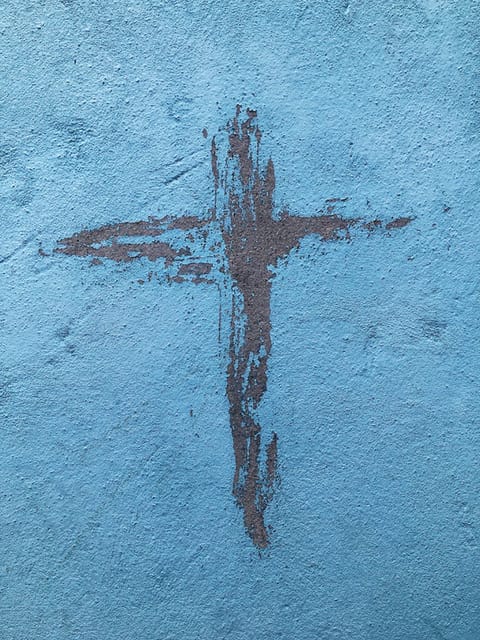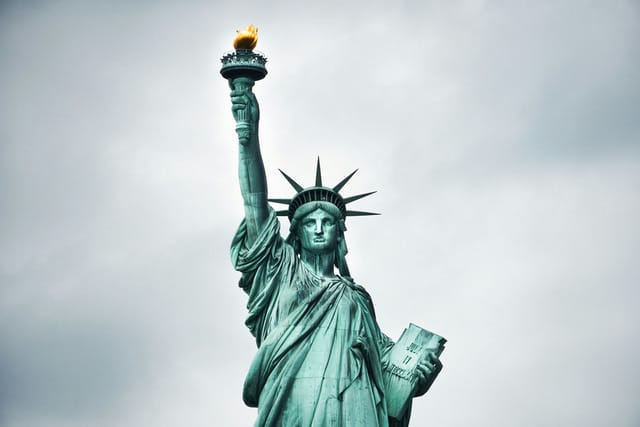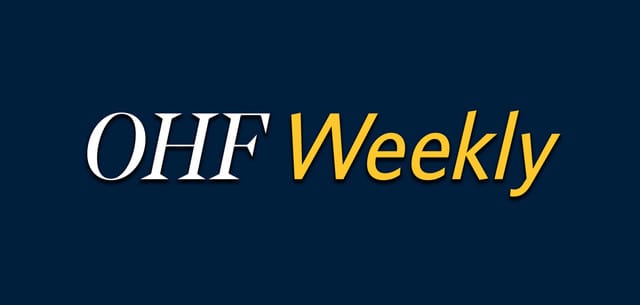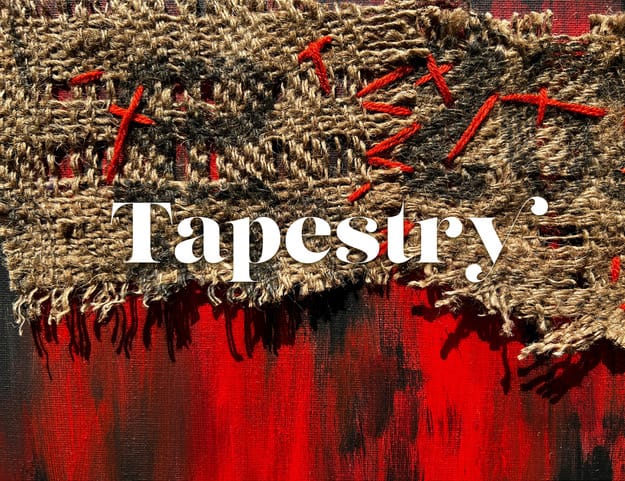
I first interviewed Clay Rivers—founder of the non-profit Our Human Family and editor-in-chief of OHF Weekly—for this newsletter in September 2020. That interview, in the midst of the Covid pandemic and in the aftermath of the murder of George Floyd, was titled "Keeping Hope Alive."
In April 2022, I interviewed Rivers again, with a specific focus on Christianity in an interview titled "Is God Love?"
In April last year, in the aftermath of a Florida school banning the PG-rated Disney movie telling the story of "Ruby Bridges," I called on Rivers again. In that interview—"Talking to White People About Racism"—I got to ask Rivers, who himself has had a wide-ranging Disney career, why he thought protecting white students from “discomfort” was being given priority over the truth of Black history.
This year, I'm calling on Rivers earlier in the year than ever. But as the culture wars continue—and as attacks on CRT have morphed into attacks on ESG into attacks on DEI—I wanted to talk to Clay Rivers specifically during Black History Month.
Q&A with Clay Rivers
How’s your optimism level right now?
Greetings, Richard. It’s good to be with you and your readers again. In a broad sense, my optimism still sees the glass as half full, but optimism is not enough to contend with the issues America is facing. Optimism that things will “work out” certainly isn’t enough to stem the tide of problems facing Black, Indigenous, People of Color, and other groups of marginalized people.
It’s like this: Right now in America, there’s an all-out assault on human rights, and there’s a small but vocal band of arsonists running around setting everything in sight on fire, all in the name of freedom. But there are also two other groups of people in this scenario. One is a small contingent doing its best with the little resources they have to extinguish the flames and alert others of the potential for their houses to catch fire.
The other group, a larger, well-heeled, well-meaning but short-sighted band, aware of their neighbor’s plight, is content thinking since the flames haven’t reached their house, they have nothing to worry about, and things will turn out alright. So they continue about their business. Apathy at its finest.
Knowing a problem exists and working to solve that problem are two very different things. Awareness of America’s racial inequity is not the solution. It is, however, the first step in resolving the issue.
With that said, yes, I’m optimistic that things will work out in the long run. But I’m certain that many of the rights and freedoms Black, Indigenous, People of Color, and marginalized groups enjoy will continue to be stripped away if more of us don’t stand up for what we know is right.
What gives you hope?
Without getting too preachy, my hope comes from that which I put my trust in, Jesus—not the Jesus who’s okay with turning away the homeless, the unemployed, and immigrants; not the Jesus who supports denying the humanity of Black, Indigenous, and People of Color, and definitely not the gun-totin’, compassionless Jesus of the Haves.

My hope resides in the one who taught about loving one another, forgiveness, and radical inclusion. The source of my hope says that it’s all going to work out in the end. He doesn’t say it will be easy, perfect, or without some bumps in the road. And he never said we should kick back and relax in complacency and wait for others to do the work that so desperately needs to be done. Love doesn’t work that way.
We have to work to bring about the world we aspire to have. We have to resist the forces that would seek to steal, kill, and destroy by being an active force for good by choosing to love one another instead of choosing to hate.
To think all the issues America is struggling with today will sort themselves out independently of our involvement is to concede defeat.
The teaching of Black history has been under attack for a few years and now there is a very aggressive push to destroy DEI. Does Black History Month take on new meaning for you this year?
Correction: Attempts to silence the teaching of Black history, the triumphs we’ve achieved, and the contributions Black people have made to this country despite the injustices we endured have been going on since before we were brought here. Enslavers kidnapped and brought Africans here under the pretense that we had no culture, no knowledge, and no value except that ascribed to us by enslavers.
One need only check source documents to learn that enslaved Africans were brought to America with a wealth of knowledge from their own culture and heritage. And that knowledge helped lay the foundation for and still continues to help keep America ranked as one of the wealthiest countries in the history of the world. The failure to acknowledge these achievements exists to prop up the lie of white supremacy.
The fact that so many adults of all stripes have no idea that hundreds of incidents like the Ocoee Massacre, the railroading of the Groveland Four, and the lynching of Emmett Till even took place. The purpose of learning Black history is manifold. Carter Woodson, the founder of what is now known as Black History Month, wrote, “If a race has no history, it has no worthwhile tradition, it becomes a negligible factor in the thought of the world, and it stands in danger of being exterminated.”

Black History has always held a special place in my head and heart. It has informed my self-perception and continues to shape my opinion of my people’s contributions to our country. In response to acts to remove Black History from memory, we’ve expanded our repertoire to include more history-based articles. And our readers love us for it!
Richard, on the face of all this erasure, there’s an overt fear that Black, Indigenous, People of Color, and marginalized groups live with this burning desire to exact vengeance for the atrocities we’ve been subjected to.
Nothing could be further from the truth.
All we want is to 1) live in peace and 2) have the same rights and privileges set forth in the Constitution that are lavished without fear or prejudice upon America’s white citizens. That’s all.
We know what it is to live with constant persecution under the penalty of death of our loved ones and ourselves. We do not wish that fate upon anyone. Our goal is to Live. In. Peace. Why is that so hard for people to accept?
What’s your take on the book banning we’re seeing in schools, especially as it impacts LGBTQ+ students in terms of access to information and decreased representation?
It’s sad on every conceivable level. The haphazard banning of LGBTQ+ books, just like the removal of works by celebrated Black authors and the resistance to incorporate Black history into American history, serves to demonize, dehumanize, scapegoat, and ultimately erase LGBTQ+ from society. Just yesterday, Florida’s Department of Highway Safety and Motor Vehicles mandated that Florida residents can no longer elect to change their gender on their driver’s license. The state says a person’s sex at birth is the only valid gender marker on driver’s licenses.
Everyone understands that people feel they are a valuable part of society, and their existence is validated when they see people they identify with. All this nonsense is being wrought on America for one purpose: to elevate CIS gender, straight, radically conservative white people and denigrate anyone who doesn’t fall into that shrinking demographic.
Our Human Family focuses a lot on allyship. What advice do you have for “allies” right now—anyone who wants to promote more respect and tolerance in American society in 2024?
I have to stop you there for a second, Richard. Tolerance isn’t something Our Human Family promotes. Tolerance doesn’t require that “in-group” members try to understand, empathize, sympathize, and treat Black, Indigenous, or People of Color—or any marginalized group of people for that matter—with respect and care. Tolerance only suggests, and weakly at best, that in-group members merely endure people they don’t care for. I can hear they rallying cry now, “Come on, Team Us. You only have to put on a faux smile and grit your teeth. It’s only for a few minutes and they’ll be out of your hair.” No, allyship is about getting one’s hands dirty while treating others with the same respect and care one expects for oneself.
But back to your question . . . the short answer is: Now is not the time for anyone to sit on their hands with their thumbs up their butt and their mouth closed!

The long answer consists of two parts that are best addressed at length, two essays that ranked among our most-read top twelve articles of 2023: “The Redux: If Not Now, White Folks, When?” by yours truly and “10 Steps to Being an Ally to Marginalized Groups” by OHF Weekly Managing Editor, Sherry Kappel. “If Not Now” is a hardcore call to action for people who haven’t decided whether to get in the game. If, after reading my candid take on what it’s like as a Black man to watch some white folks ponder the validity of allyship versus others who have no problem standing up against racism, readers still don’t get it, chances are they never will. And “10 Steps” is a nuts and bolts how-to article brimming with actionable goals people can enact to foster equity and lessen the fear of people who may look, live, or love differently than they do.
What’s new with OHF in 2024? What have you got planned? What are you hoping to make happen? Where can people find you?
Funny you should ask. Since we first began, OHF Weekly and Our Human Family have focused almost exclusively on nonfiction as the genre of choice to advocate for and share about racial equity, allyship, and inclusion. We’ve dabbled in poetry with our Equal People Poetry Series 2020 and 2021. The response was favorable, so we’ve launched a new section in our publications devoted exclusively to poetry, entitled Tapestry. Check out our first call for poets. This should be very exciting!
For the longest time, I thought nonfiction was the best way to connect with our readers. And while it is an excellent way to connect readers with facts and real-world experiences, I’ve come to realize that nonfiction is undoubtedly not the only way to broaden people’s perspectives. Sometimes, the ethereal nature of poetry, the way it can transcend time and space and pierce parts of us that prose cannot reach.

Let’s see . . . what else is going on?
In the ongoing column, we’ve partnered with a couple clients in presenting Our Human Family’s Allyship 101: The Basics workshop, so that’s going very well.
Hopefully, we’ll develop a speaker series this year and crank out another issue of OHF Magazine. If I must say so myself, our third issue, inspired by the works of Toni Morrison, is by far our most visually stunning and thematically daring issue to date.
Since we last chatted, given that Elon Musk’s social media platform pretty much endorses all that Our Human Family opposes, we’ve abandoned the site formerly known as Twitter and set up shop at Mastodon. It’s nice, in fact we invite readers to follow us. Our posts are warmly received and we don’t have to worry about the platform shadowbanning us.
There’s so much I’d like to see Our Human Family do, but it all takes time and money. If your readers would like to financially support Our Human Family’s advocacy of racial equity, allyship, and inclusion, a one-time or monthly tax-deductible donation would be greatly appreciated. No gift is too small.
All of our online and social links can be found in our linktree.
Thanks for the opportunity to chat with you. It’s always a joy. Love one another!
This newsletter comes to you ad-free and with no paywall. If you haven't already, please sign up now to get future issues delivered free by email... or, if you can, support with a paid annual subscription for just $2/month.
Subscribe to Unprecedented
Subscribe to the newsletter and unlock access to member-only content.